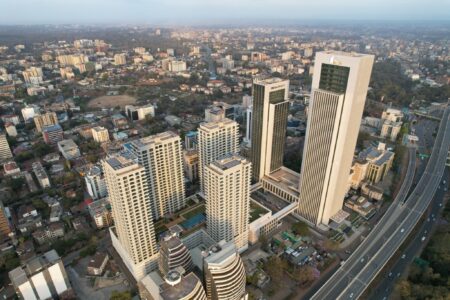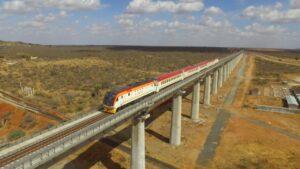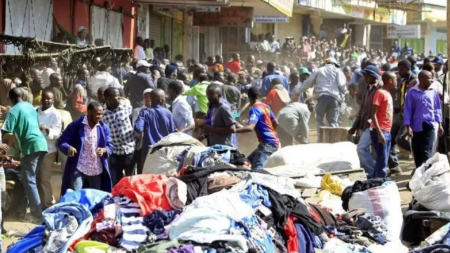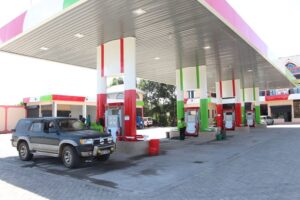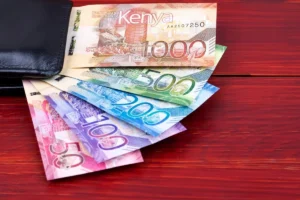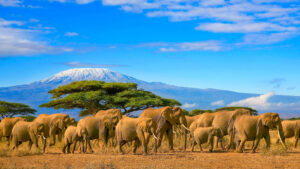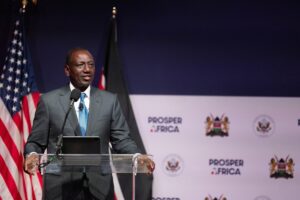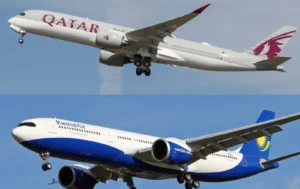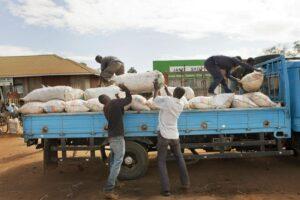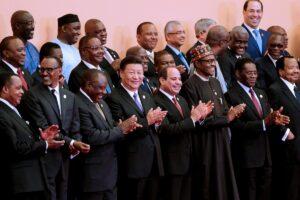- Africa’s new dawn: the rising role of digital and AI in agriculture
- Can Dangote Refinery Transform Africa Energy Ambition
- Gallup Survey: 80 per cent of Kenyan Workers Are Disengaged and Seek New Opportunities
- Madagascar Man Freed from 5KG Tumor After 15-Year Struggle
- How women in Africa are perceived and treated
- Sugar consumption in Kenya to Increase to 1.23 Million Tonnes
- Can Somalia and Turkey Oil deal Bring Change in Somaliland
- Remittances to Kenya dropped to $371.6 million in June, marking a six month low
Business
- Office Occupancy Levels Across Africa increased by an average of 15 percent from 2022 numbers
- Knight Frank also points to rising investor interest in the continent’s manufacturing, mining, and energy sectors.
- In the retail market, there is a strong focus on enhancing consumer experiences across the continent.
Office occupancy levels across Africa’s office markets have recovered from 60 per cent in 2022 to 75 per cent this year, according to global property consultant, Knight Frank’s biennial 2024/25 Africa Report.
This notable improvement in office occupancy levels is largely attributed to the gradual return to the office following the disruption caused by the pandemic. For example, Kenya’s office occupancy rate now stands at 77 per cent, driven by the limited supply of prime offices – just 617,000 sqm is expected by the end of 2024, while take-up levels remain steady.
According to Mark Dunford, CEO, Knight Frank Kenya, there is …
- The firms exploit legal loopholes to steal, they exploiting gaps in beneficial ownership laws to repatriate billions of profits in the mining sector
- According to the report, Kenya’s mining industry has the potential to contribute 4-10 percent of the country’s gross domestic product.
- The country earned Sh300 billion from the mining sector last year.
Corrupt individuals in Kenya are exploiting gaps in beneficial ownership laws to repatriate billions of profits in the mining sector, limiting its contribution to the general economy.
A new report released by the Global Financial Integrity (GFI) dubbed ‘Illicit Financial Flows Related to Beneficial Ownership in the Mining Sector in Kenya’ regrets that several billions have been lost over the years.
According to the report, Kenya’s mining industry has the potential to contribute 4-10 percent of the country’s gross domestic product.
…“Unfortunately, the sector contributes less than a percentage of the country’s GDP which is significantly
- Kenya’s $168Bn plundered development loans were taken over 11 year period between 2010 and 2021
- In one instance, the OAG raised an issue with the missing drawdowns for three loans from BELFIUS Bank and Unicredit totaling €29,510,462 (Sh4.1billion).
- The audit examined how 39 commercial loans valued at $168billiom (Sh1.36 trillion) during the time were used, and whether they were borrowed legally.
The Office of the Auditor General has opened a can of worms on the possible diversion of loans and plunder of funds disbursed to Kenya for development over the past 10 years.
A Special Audit by Auditor General Nancy Gathungu, on loans Kenya took between 2010 & 2021 shows that the country received $ 167.7 billion (Sh1.13 trillion) in the consolidated funds accounts however, the accountability of the funds is in question.
The revelations come at a time when President William Ruto has already gazetted the Presidential Taskforce on …
- Kenyan Shilling to Reach Sh138 this month as effects of global rates and heavy rains come alive
- Additionally, the minor decline in the foreign exchange reserves between April and May signals interventions in the forex market by the CBK.
- The CBK is expected to leave rates unchanged at 13 per cent at its June meeting to support these dollar inflows and provide positive yields to investors.
Financial experts are now predicting that the Kenyan shilling will depreciate to Sh138 against the US dollar by the end of June 2024.
The analysist from pan African market insights firm Stears, say that the Kenyan shilling witnessed large swings in May, after appreciating 2.09 per cent between May 2 and 16. This saw the local currency resume a consistent depreciation to close the month at Sh133.37 against the dollar.
Stears notes that although the currency remained relatively unchanged compared to April, on average, …
- At the convergence of technology and marketing, social media platforms have become an imperative tool for businesses
- Recognising your target audience is the foundation of an effective social media strategy.
- Artificial intelligence (AI) has become increasingly imperative in the digital marketing landscape.
Social media marketing
Social media has transformed from a platform for personal connection into a relevant tool for businesses to engage with their audience, build brand awareness, and drive growth. The power of social media in business cannot be underestimated, as it offers a myriad of opportunities for organisations, brands and people to thrive in the competitive landscape.
At the convergence of technology and marketing, social media platforms have become an imperative tool for businesses and organisations to promote their brands and connect with their target audience. With the widespread adoption and ever-changing features, social media has a superior say on digital marketing strategies.
Furthermore, social media marketing …
- Small and medium enterprises have become vital drivers of economic growth in African countries.
- According to the African Development Bank Group, SMEs in Africa represent around 90 per cent of all businesses and contribute up to 33 per cent of Africa’s Gross Domestic Product (GDP).
- Access to capital is one of the biggest obstacles small and medium enterprises face in Africa.
Small and medium enterprises (SMEs) in Africa play a vital role in fostering sustainable development. With 90 per cent of all global businesses falling under the MSME category, these enterprises create employment, foster innovation, and contribute to gross domestic product (GDP) growth.
In recent years, small and medium enterprises have become vital drivers of economic growth in African countries. As the continent undergoes rapid development, these enterprises foster innovation, create jobs, and contribute to economic growth.
Small and medium enterprises form the bedrock of African economies, representing various …
- The tourism sector is increasingly important in the global economy.
- Tourism in Africa is still at an embryonic stage of development and is highly interconnected with longstanding growth and development challenges in infrastructure and security.
- A report predicts that a growing middle class will fuel Africa’s travel and tourism industry and a projected CAGR of 8.9 per cent or $731.4 billion in 2032 in the “leisure” market.
Tourism sector in Africa
Tourism sector is increasingly important in the global economy, contributing up to 5 per cent of total gross domestic product (GDP), 30 per cent of service exports, and approximately 225 million job opportunities.
Indeed, approximately 1 billion people travel internationally annually. Consumer receipts on tourism, hospitality, and recreational activities in Africa are projected to hit about $261.77 billion by 2030, $137.87 billion more than in 2015. From 1998 to 2015, service exports, such as tourism, have grown sixfold faster …
- There is urgency in halting the digital divide in Africa as this is vital in promoting inclusive growth, alleviating poverty, and generating more jobs through the digital economy.
- Kenya is setting an example by ensuring all its buildings are fiber-optic-ready.
- Digital automation in trade has proven to be a valuable asset in safeguarding Africa’s social and economic growth.
Digital Divide in Africa
Digital divide in Africa has been exacerbated over the years and, the urgency to halt it is vital in promoting inclusive growth, alleviating poverty, and generating more jobs through the digital economy.
Africa, with a population of 1.4 billion, currently has only 473 million internet users, representing a 36 per cent penetration rate and a mere 5 per cent fixed broadband penetration due to limited undersea connectivity. This leaves the continent lagging behind other regions regarding digital infrastructure, a critical component for economic growth.
African policymakers should capitalise …
- Kenya lands $ 1 billion investments for digital Infrastructure investment from Microsoft and G42.
- Among the top priorities is the construction of a green data center. This facility is to be built by G42 and its partners.
- The initiative will enhance internet connectivity through investments in marine and terrestrial fiber cable infrastructure.
During Kenyan President William Ruto’s visit to the US, Tech giant Microsoft & G42, an Emirati AI company, announced a $1B investment in Kenya to support its digital transformation.
This initiative, undertaken in collaboration with the Republic of Kenya’s Ministry of Information, Communications, and the Digital Economy, is a milestone in the region’s technological advancement.
The collaboration will invest an initial $1 billion to support different components of the initiative.
Among the top priorities is the construction of a green data center. This facility, to be built by G42 and its partners, will host Microsoft Azure services in …





